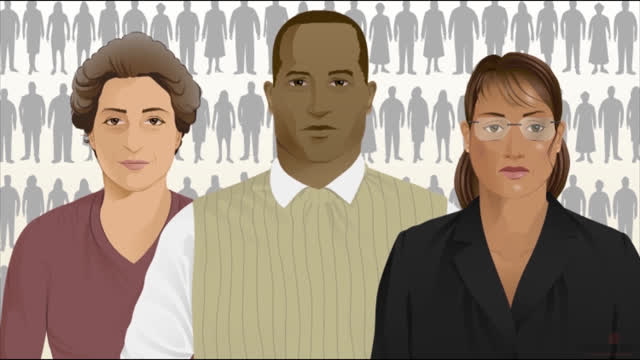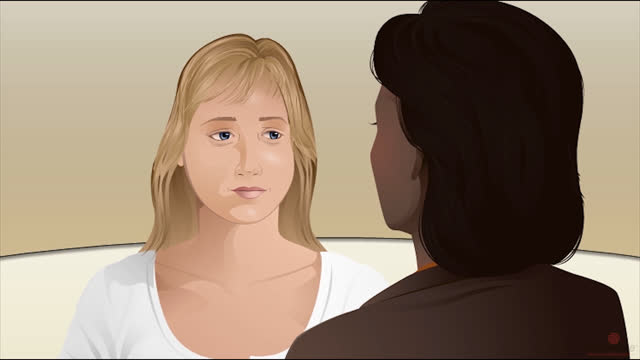Top of the pageCheck Your Symptoms
Feeling Depressed
Topic Overview
Life is full of changes. Everyday events and our reactions to them sometimes interfere with our sense of well-being and peace of mind. It is common to get the blues or become sad when disappointed. Symptoms of depression are the most common medical problems seen by health professionals. It is estimated that feelings of depression will affect about one-third of all adults in the United States at some time in their lives.
Most people experience feelings of sadness over such losses as divorce or separation, the death of a friend or loved one, or a job change or layoff. These feelings are an expected reaction to a “triggering event,” and most people get over them in time.
Several factors increase your risk of developing feelings of depression, such as:
- Being female. Women are twice as likely as men to experience feelings of depression. Hormonal changes may play a role in these feelings, which may be more evident during pregnancy, especially shortly after the birth of a baby (postpartum depression) or shortly before or during menopause. Some women experience feelings of sadness or depression shortly before the start of menstruation (premenstrual syndrome, or PMS).
- Age older than 60. Feelings of depression in this age group are frequently overlooked because the symptoms are similar to other diseases and problems experienced by older adults. Adults in this age group are more likely to experience social isolation. Feelings of sadness may accompany other life events, such as retirement, death of a spouse or child, or declining physical abilities.
- Personal or family history. You are more likely to experience feelings of depression if you have a history of previous depression, an anxiety disorder, or another mental illness. You are also 2 to 3 times more likely to experience feelings of depression if one or both of your parents were diagnosed with depression.
- Medical problems—such as cancer, kidney disease, heart disease, or Parkinson’s disease—or substance use disorder or withdrawal.
- Stressful life events, such as changing jobs, the loss of a job, or children leaving home.
- Lack of family or social support.
Symptoms of depression that may point to a need for treatment vary from person to person. If you experience feelings of sadness or loss of interest in pleasurable activities plus 4 or more of the following symptoms for 2 weeks or longer, you may be depressed.
- Changes in appetite or weight
- Restlessness or decreased activity that is noticed by others
- Feeling tired or sleepy all of the time
- Trouble sleeping or sleeping more than usual
- Inability to concentrate or make decisions
- Feelings of hopelessness
- Feelings of worthlessness or guilt
- Preoccupation with death or recurrent thoughts of suicide
People who feel depressed may also have physical symptoms, such as body aches or stomach problems.
Because “mood swings” and other emotional changes are considered a normal part of growing up, depression in children and teens often goes unrecognized. Children and teens do develop depression, and it can affect a child’s quality of life. If prolonged or severe depression is left untreated, it can lead to serious outcomes, including suicide attempts and even completed suicide. If you are thinking about suicide, talk to someone about your feelings, such as your health professional or a close friend or family member you trust. Don’t wait. If you are not able to talk with your health professional immediately, call your local suicide hotline or this suicide hotline (Canada and U.S.): 1-800-SUICIDE or 1-800-273-TALK or 1-800-273-8255.
Depression is the most important risk factor for suicide. For more information, see the topic Depression.
Check your symptomsto decide if and when you should see a doctor.
Health Tools
Health Tools help you make wise health decisions or take action to improve your health.
Check Your Symptoms
The medical assessment of symptoms is based on the body parts you have.
- If you are transgender or nonbinary, choose the sex that matches the body parts (such as ovaries, testes, prostate, breasts, penis, or vagina) you now have in the area where you are having symptoms.
- If your symptoms aren’t related to those organs, you can choose the gender you identify with.
- If you have some organs of both sexes, you may need to go through this triage tool twice (once as “male” and once as “female”). This will make sure that the tool asks the right questions for you.
Many things can affect how your body responds to a symptom and what kind of care you may need. These include:
- Your age. Babies and older adults tend to get sicker quicker.
- Your overall health. If you have a condition such as diabetes, HIV, cancer, or heart disease, you may need to pay closer attention to certain symptoms and seek care sooner.
- Medicines you take. Certain medicines, herbal remedies, and supplements can cause symptoms or make them worse.
- Recent health events, such as surgery or injury. These kinds of events can cause symptoms afterwards or make them more serious.
- Your health habits and lifestyle, such as eating and exercise habits, smoking, alcohol or drug use, sexual history, and travel.
Try Home Treatment
You have answered all the questions. Based on your answers, you may be able to take care of this problem at home.
- Try home treatment to relieve the symptoms.
- Call your doctor if symptoms get worse or you have any concerns (for example, if symptoms are not getting better as you would expect). You may need care sooner.
Symptoms of depression may include:
- Feeling sad or hopeless much of the time.
- Losing interest in or not getting pleasure from activities you once enjoyed.
- Not feeling as hungry as you used to, or eating a lot more than you used to.
- Sleeping too much or not enough.
- Feeling restless and not able to sit still.
- Feeling tired or as if you have no energy.
- Feeling unworthy or guilty for no reason.
- Finding it hard to focus, remember things, or make decisions.
- Feeling anxious or worried about things, often with no reason.
Many prescription and nonprescription medicines can affect your mood and cause symptoms of depression. A few examples are:
- Medicines for depression and anxiety.
- Seizure medicines (anticonvulsants).
- Corticosteroids, such as prednisone.
- Medicines that contain hormones, such as birth control pills and hormone therapy used to treat the symptoms of menopause.
- Pain medicines.
Symptoms of depression can also be caused by the use of or withdrawal from alcohol and illegal drugs.
The risk of a suicide attempt is highest if:
- You have the means to kill yourself, such as a weapon or medicines.
- You have set a time and place to do it.
- You think there is no other way to solve the problem or end the pain.
Seek Care Today
Based on your answers, you may need care soon. The problem probably will not get better without medical care.
- Call your doctor today to discuss the symptoms and arrange for care.
- If you cannot reach your doctor or you don’t have one, seek care today.
- If it is evening, watch the symptoms and seek care in the morning.
- If the symptoms get worse, seek care sooner.
Make an Appointment
Based on your answers, the problem may not improve without medical care.
- Make an appointment to see your doctor in the next 1 to 2 weeks.
- If appropriate, try home treatment while you are waiting for the appointment.
- If symptoms get worse or you have any concerns, call your doctor. You may need care sooner.
Seek Care Now
Based on your answers, you may need care right away. The problem is likely to get worse without medical care.
- Call your doctor now to discuss the symptoms and arrange for care.
- If you cannot reach your doctor or you don’t have one, seek care in the next hour.
- You do not need to call an ambulance unless:
- You cannot travel safely either by driving yourself or by having someone else drive you.
- You are in an area where heavy traffic or other problems may slow you down.
The National Suicide Hotline 1-800-273-8255 is also a resource.
Call 911 Now
Based on your answers, you need emergency care.
Call911or other emergency services now.
The National Suicide Hotline 1-800-273-8255 is also a resource.
Home Treatment
If you are thinking about suicide, talk to someone about your feelings, such as your health professional or a close friend or family member you trust. Don’t wait. If you are not able to talk with your health professional immediately, call your local suicide hotline or this suicide hotline (Canada and U.S.): 1-800-SUICIDE or 1-800-273-TALK or 1-800-273-8255.
Positive actions and feelings can help lift your spirits. Although thinking positively may be very difficult when you are feeling depressed, try to consider the positive side of situations and events in your life.
Appreciate any moments when you have positive thoughts. The following tips may help.
- Practice positive thinking. Make statements that promote good thoughts. Replace negative self-talk with positive comments.
- Take action to put more fun into your life:
- Exercise. Running, brisk walking, and other forms of aerobic exercise improve symptoms of mild to moderate depression.
- Work in the garden or play with a pet. Plants and pets can be very therapeutic. When you pet an animal, your blood pressure goes down and your heart rate slows. Filling the needs of animals and plants can help you feel useful.
- Visit a friend. Spending time with a good friend may help you forget about your problems for a while and help you see the brighter side of life.
- Have a massage or a manicure, or get your hair cut.
- Rearrange your furniture.
- Talk with your health professional about nonprescription medicines, such as SAM-e.
- Talk to your health professional or pharmacist before taking complementary medicines. Some can interfere with other medicines.
- Do not use alcohol or other mood-altering drugs while you are taking a nonprescription medicine.
- Follow the directions on the label. Do not exceed the recommended dose.
- If you are or could be pregnant, talk with your health professional before taking any medicine or supplement.
- For more information on dietary supplements, visit the website of the Office of Dietary Supplements, within the National Institutes of Health, at http://ods.od.nih.gov/index.aspx.
- Take a class or go to a free lecture at the public library or local hospital.
- Take a vacation. Sometimes just getting away for the afternoon will brighten your mood.
- Go to the movies or rent a funny movie.
- If nothing feels fun, try doing something that you used to enjoy.
Symptoms to watch for during home treatment
Call your doctor if any of the following occur during home treatment:
- You feel sad, lonely, or unhappy for weeks.
- Your symptoms become more severe or frequent.
- You are not getting better as expected after starting treatment for depression.
If you think a friend or loved one is depressed, you may feel helpless. But there are still things you can do to help the person, such as talking with him or her about getting treatment. You can offer support and be a caring friend.
Prevention
Life is full of changes. Everyday events and our reactions to them sometimes interfere with our sense of well-being and peace of mind. While it is common to get the “blues” or to feel sad occasionally, you may be able to prevent feelings of depression.
- Have a regular checkup with your health professional. Your health professional may evaluate your thyroid function and other factors. Many other diseases, such as coronary artery disease and diabetes, can increase your risk of feeling depressed.
- Talk to your health professional about light therapy if you think that you feel worse during the winter months. Just 30 minutes of light therapy each day improves mood in many people with seasonal affective disorder (SAD). For more information, see the topic Seasonal Affective Disorder (SAD).
- Maintain regular sleep and eating patterns. Do not skip meals.
- Try to get some exercise every day. Walking is a good way to start.
- Get involved in social groups or volunteer to help others. Being alone makes things seem worse than they are.
- Do not use alcohol or illegal drugs, such as cocaine, amphetamines, or heroin, to “self-treat” your symptoms. A treatment plan that includes prescription medicine and regular visits to a health professional is much safer and more effective.
- Do not smoke or use other tobacco products. Smoking increases your risk of developing coronary artery disease. The use of smokeless (spit) tobacco increases your risk for developing cancer of the mouth, neck, throat, and digestive tract. Your risk of developing depression increases if you have coronary artery disease or cancer.
Preparing For Your Appointment
To prepare for your appointment, see the topicMaking the Most of Your Appointment.
Before seeing your health professional, it may be helpful to keep a diary of your symptoms. You can help your health professional diagnose and treat your condition by being prepared to answer the following questions:
- How long have you been troubled with a depressed mood? What is your major symptom?
- What was happening in your life when the depressed mood started?
- How long have you had your symptoms? Do they come and go or are they always present?
- Have you ever had a similar problem in the past? If so, how was it treated?
- What makes your symptoms better or worse?
- Do you have any other symptoms that may be related to your major symptom? Symptoms may include:
- Rapid or irregular heartbeat.
- Nausea or vomiting.
- Numbness or weakness.
- Excessive sweating.
- Feeling like you are not able to get enough air (air hunger).
- Restlessness, irritability, or feeling on edge.
- Feelings of overwhelming anxiety or fear.
- What prescription or nonprescription medicines are you currently taking?
- Are you using alcohol or illegal drugs, such as marijuana or cocaine, to manage your symptoms?
- Have you ever attempted suicide?
- Has a family member or close friend tried suicide or killed himself or herself?
- Has anyone else in your family ever been diagnosed with a mental health problem, such as depression or an anxiety disorder?
- Are you taking a medicine to treat depression? What is the medicine? When did you start the medicine? What is the dose that you are taking? Have you or your health professional changed the dose?
- Do you have any health risks?
Current as of: June 26, 2019
Author: Healthwise Staff
Medical Review:William H. Blahd Jr. MD, FACEP – Emergency Medicine & Kathleen Romito MD – Family Medicine & Adam Husney MD – Family Medicine & David Messenger MD
This information does not replace the advice of a doctor. Healthwise, Incorporated, disclaims any warranty or liability for your use of this information. Your use of this information means that you agree to the Terms of Use. Learn how we develop our content.




